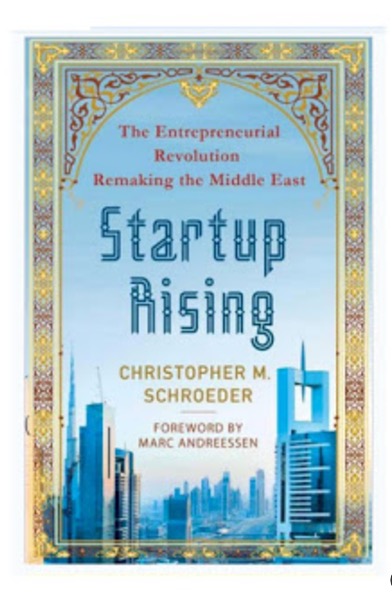Much has changed in the Middle East over the last twenty years. Israel’s economy has shifted to more open and less socialist, and average income has increased. The Israeli government still controls much of the economy and subsidizes money-losing firms, but a vibrant tech sector is home for hundreds of innovative startups.
Christopher Schroeder’s Startup Rising: The Entrepreneurial Revolution Remaking the Middle East gives a glimpse of what to expect as venture capital first supports dozens, then hundreds, and soon thousands of Middle East entrepreneurs from the Palestinian territories to Jordan, Lebanon, the UAE, Egypt and countries now in turmoil.
Imagine the Middle East with millions carrying hand-held computers. That’s not some distant utopian tech future but today in the Middle East. For the over 75 million people in Turkey, nearly 90% have cell phones. Cell phones network friends and relatives, speed business communication, and allow access to news and information from the outside world.
The stories from Startup Rising paint an optimistic future for the Middle East. Israel already enjoys a dynamic tech sector, and now capital and expertise are surging into nearby Arab countries.
More on Startup Rising is available by “looking inside” on Amazon. Plus online videos with Christopher Schroeder, the author, tell his story. Here is link to a Google for Entrepreneurs video from December, 2013. About five minutes in, this Economist article is mentioned with its focus on “Startup Spring” in the Middle East. Excerpt from The Economist:
The story sounds like a common one from Silicon Valley or Silicon Roundabout, London’s start-up district. But Ms Taher tells it in a café in Amman. She is just one of several hundred entrepreneurs, many of them women (see article), who have started online firms in Jordan’s capital in recent years, making it one of the Middle East’s leading start-up hubs. Even more surprising, such clusters (“ecosystems” in the lingo) have been popping up all over a region that is better known for armed conflict and political strife. Whether in Beirut, Cairo, Dubai, Riyadh or even Gaza City, small technology firms are multiplying, creating a sort of “start-up spring”. (Link to source.)
Here is a review of Schroeder’s book from the Stanford Social Innovation Review. Excerpt:
In 2001, when Save the Children wanted to launch a version of Junior Achievement in Jordan, they asked Salti to be country director of what they called “INJAZ Jordan,” or Jordan Achievement. Holding her freshl
y minted MBA from Northwestern, Salti accepted, eager to return home and make an impact. She later would found a regional INJAZ office to spread the model across fourteen countries in the Middle East.
INJAZ was one of the earliest “private public partnerships,” as they are commonly called today. Salti and her mother started with a USAID grant that matched contributions from local businesses, and chose schools in conjunction with the Ministry of Education. Their goal was to hold additional classes at the end of each day to not only supplement education, but also to focus on job-related skills and to push kids to think about entrepreneurship and develop their own ideas. Their first volunteers were friends and family, and they soon began to recruit local business leaders and their staffs to mentor and train local youth in after-school programs.
Junior Achievement in Jordan also teaches entrepreneurship to you ng people. Junior Achievement Middle East and North Africa on their JA website.
ng people. Junior Achievement Middle East and North Africa on their JA website.
Segment from a Milken Institute panel with Christopher Schroeder.
Instead of–or in addition to–advocating a two-state Israel/Palestine, U.S. policy could encourage technology entrepreneurs across the Middle East. The U.S. could promote reduced barriers to funding new enterprises and development and marketing their products.
Better policies would encourage employment and boost technology firms. Reforming broken or outdated U.S. policies helps promote prosperity in the Palestinian territories and across the Middle East.
Also an entrepreneurial success story: “Palestinians attempt to create their own start-up nation,” (Financial Times, May 1, 2016):
Less than five years later, Yamsafer is one of the region’s largest hotel booking sites, according to its founder. It recently closed a $3.5m funding round in one of the biggest venture capital deals the Israeli-occupied Palestinian territories have seen.
Yamsafer employs 70 people in Ramallah, a place where too many young university graduates are chasing too few jobs. “The people we hire are more hungry than people you would have hired in Dubai, Jordan or elsewhere,”
